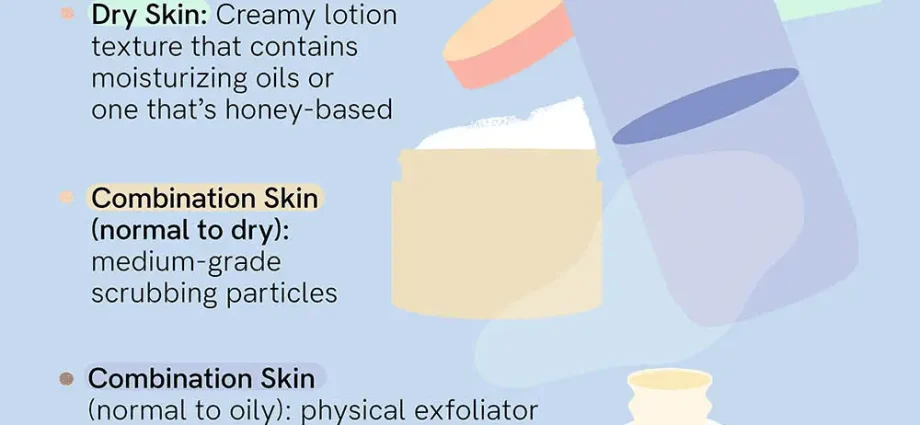Contents
After reading this article, you yourself will be able to answer this question. And at the same time, decide which of the exfoliation methods suits you best. An overview of peels and scrubs for different skin types is attached.
What is peeling
Peeling and scrubbing have one goal – to renew the skin, exfoliate old cells and start the process of forming new ones. But the mechanism of action and approach of these methods are different. Let’s compare.
In cosmetology, peeling is a method of removing dead skin particles from the surface of the skin. The main components of the composition for acid peeling are fruit (AHA) acids, which weaken the bond between the scales of the stratum corneum and accelerate their exfoliation. The most popular is considered glycolic acid.
Until recently, acid peeling was the prerogative of salon care, but today AHA acids can also be found in the composition of cosmetics sold in stores.
By answering the questions of our test, you will find out what you are missing in your daily skin care.
Tonics, serums, concentrates
The products for daily use are distinguished by a low concentration of acids, balanced by soothing and restoring ingredients. They act slowly and gently.
Home peels
A relatively new category of products that mimic salon peels. The concentration of acids here is slightly higher than in daily care products, but significantly lower than in professional formulas. Safety is paramount.
Peeling functions:
skin renewal;
fight against signs of photoaging (wrinkles, age spots);
smoothing skin texture and narrowing pores;
fight imperfections.
Feature of application: can be combined with other care products.
Disadvantages: sometimes cause irritation on dry and sensitive skin, increase photosensitivity.
What is a scrub
This category of products is aimed at the mechanical removal (exfoliation) of dead cells using particles that literally scrape off dead cells along with impurities from the surface of the skin. Solid particles are of two types:
natural – crushed shells of nuts and fruit seeds, sugar crystals, sand, powder from sea shells and pearls;
artificial — soft granules from polyethylene.
Scrub formulas are based on abrasive particles
The benefits of scrubs: regular use of scrubs supports the natural process of exfoliating dead cells, preventing them from accumulating on the surface of the skin, giving it a dull look and clogging pores. These products have an immediate skin-smoothing effect.
Features of the application: use 1-2 times a week, apply to damp skin in a circular motion, rinse with plenty of water.
Disadvantages: natural particles can injure sensitive and dry skin.
Is it possible to combine a facial scrub with a peeling?
If we are talking about a gentle exfoliating tool for daily care – such as serum or tonic, then the weekly scrub can not be canceled. Moreover, there are special skin cleansing products that combine acidic action with mechanical.
Overview of scrubs and peels
Peelings
Nightly Refining Micro-Peel Concentrate, Kiehl’s suitable for all skin types, even sensitive, as it works gently and gradually. Contains a mixture of fruit acids and quinoa husk extract to support the natural process of cell renewal. The first results are noticeable after a week of application.
Retexturing Activator Moisturizing Serum, SkinCeuticals very effective, although it acts very delicately, while renewing and moisturizing the skin. Ingredients: hydroxyethyl urea 20% and Hepes, hyaluronic acid and kombucha, giving the skin radiance.
Two-phase peeling concentrate for skin transformation Absolue Precious Cells Rose Drop, Lancôme
The first phase contains oils of argan tree, white limnanthes and sunflower. The second is native cells of Lancôme rose, essential oil of damask rose and centifolia rose extract, and most importantly, glycolic acid at a concentration of 3,5%, which gently exfoliates dead cells and gives radiance.
Scrubs
Soft scrub Surfine Scrub, La Roche-Posay is characterized by a delicate effect, which is provided by microparticles and Hepes. Soap, alcohol, dyes are not included.
Exfoliating cleansing gel for daily use Biosource, Biotherm cleans with soft granules without the slightest hint of aggressiveness. Can be used daily, even for sensitive skin.
Cleansing and radiance scrub “Apricot” Skin Naturals, Garnier
Enriched with emollient apricot oil. Perlite and apricot kernel powder gently cleanse the skin and remove dead cells.
When scrub and peeling are contraindicated
The choice of renewing procedures should be more carefully approached by people with sensitive skin. What can you advise them?
Stop using peeling if negative reactions occur.
When scrubbing, give preference to products with artificial polymer granules. Unlike natural abrasive particles, they are more gentle on the skin.
Acids increase the photosensitivity of the skin, so after peeling, be sure to use a product with an SPF of at least 30. This rule applies to owners of skin of any type.










